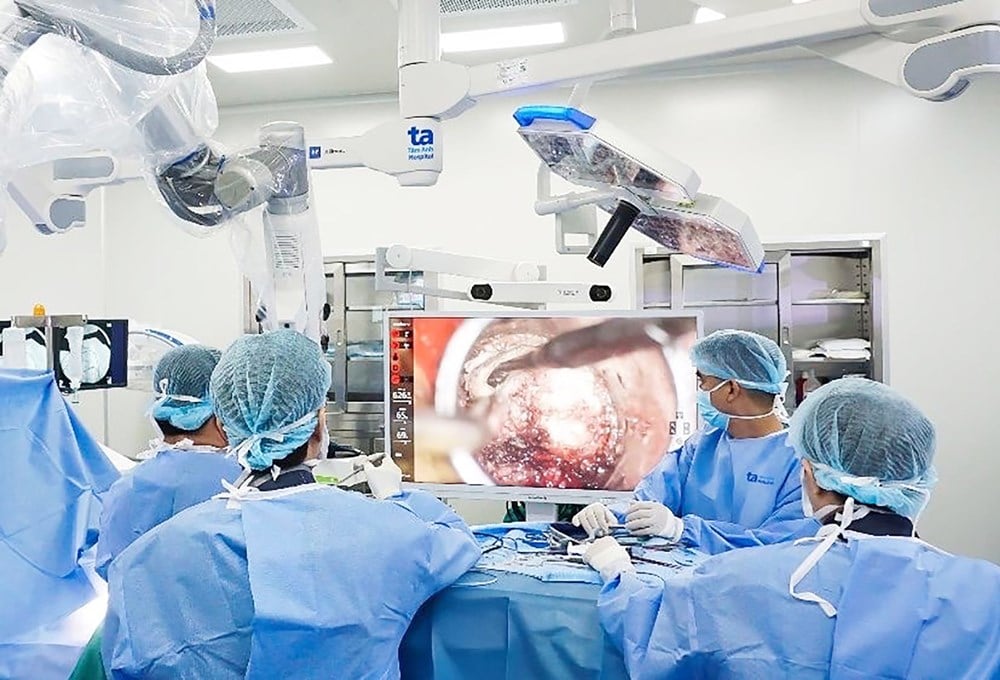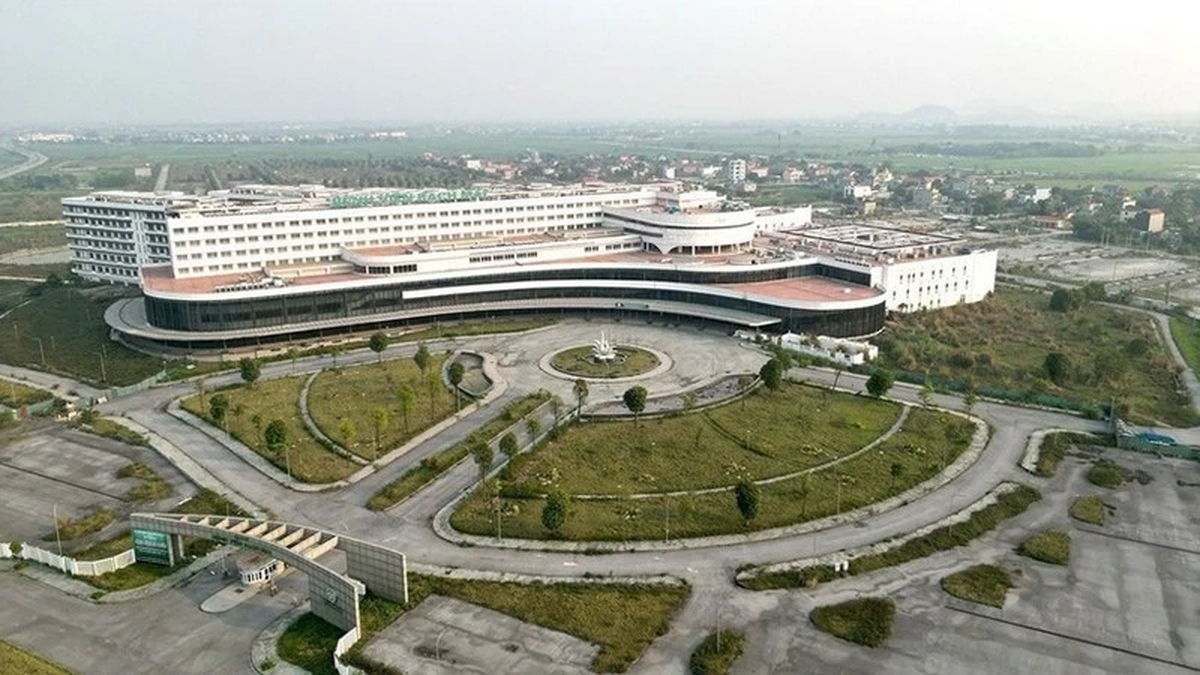In Vietnam, many large hospitals have proactively applied AI to medical examination, treatment and healthcare system management, initially bringing positive results, contributing to improving service quality and optimizing diagnosis and treatment processes.
However, along with strong development potential, AI application in healthcare also poses many challenges to ensure sustainable and safe development of medical examination and treatment.

Revolution in the operating room
Just a few years ago, the application of artificial intelligence (AI) in medical examination and treatment was still a new thing in Vietnam. But now, AI has become increasingly present in hospitals, from reception, imaging diagnosis, surgery to operational management. Not simply a supporting technology, AI is becoming an important part of modern healthcare, helping doctors make faster, more accurate decisions and care for patients more effectively.
For example, at Friendship Hospital - which receives a large number of patients every day, the need for diagnosis and treatment is increasing, especially in the field of diagnostic imaging. Thanks to the application of artificial intelligence, doctors can quickly process large volumes of images from high-resolution computed tomography (CT) and magnetic resonance imaging (MRI). AI helps accurately detect small, deep or difficult-to-see lesions with the naked eye, thereby shortening the diagnosis time and minimizing the risk of missing pathology.
Dr. Nguyen The Anh, Director of Friendship Hospital, said that the application of AI technology not only improves the quality of medical examination and treatment but also meets the requirements of innovation and digital transformation in the healthcare sector. He affirmed that investing in modern equipment and advanced technology is a strategic step to enhance professional capacity, especially in imaging diagnosis. The hospital aims to become a pioneer in the application of high technology, providing the highest quality, safest and most effective medical services to patients.
Not only diagnosis, AI also creates a revolution in the field of surgery. At Tam Anh General Hospital, the AI-integrated robot system is applied for the first time in spinal and neurological surgery, bringing outstanding treatment results. Complex diseases such as herniated discs, sciatica or spinal degeneration that used to haunt patients because of the risk of paralysis or post-operative complications are now treated safely with almost absolute accuracy.
According to Dr. Nguyen Duc Anh, Head of the Department of Neurosurgery - Spine, Tam Anh General Hospital, thanks to AI-integrated positioning and navigation tools such as the Modus V Synaptive Robot, Kinevo 900 microsurgical glasses or the Neuro-Navigation Curve system, doctors can perform surgery with precision down to the millimeter. This helps to preserve the nerve roots to the maximum, limit soft tissue damage and shorten post-operative recovery time. Many patients can walk after 1-2 days, be discharged after just a few days and quickly return to normal life.
Not only focusing on professional aspects, many hospitals are also taking advantage of AI to optimize operations and management. Prof. Dr. Le Ngoc Thanh, Chairman of the Council of Professors of Medicine, Rector of the University of Medicine and Pharmacy, Vietnam National University, Hanoi, emphasized that AI helps streamline hospital management, especially in processing electronic medical records and records. With good technology infrastructure and a well-trained team of AI users, operations will be more efficient, reducing pressure on doctors and nurses. In addition, AI can analyze large amounts of data, helping doctors diagnose more accurately and quickly. In the future, AI will continue to develop and become an indispensable part of the medical field.
Decoding the challenges to accompany the future
Although the initial positive results are noteworthy, the journey of applying AI in healthcare still has many challenges to overcome to ensure sustainability, safety and effectiveness. One of the top difficulties, according to healthcare experts, is the issue of data - the most important "fuel" for AI algorithms. In many medical facilities in Vietnam, medical records are still fragmented, unstandardized and not yet integrated into large systems. Without complete data, AI models cannot learn and improve their predictive capabilities. This is a big challenge, especially when wanting to build AI systems to support medical decision-making with high accuracy and suitable for the disease context, physical condition, genes and lifestyle of Vietnamese people.
In addition, the Vietnamese healthcare sector still lacks a team of experts with in-depth expertise in two fields: Information Technology and Medicine. Implementing AI is not simply a matter of installing software, but also requires an understanding of algorithms, clinical data, and medical ethics. On the other hand, the uneven implementation capacity among hospitals, especially in remote areas, further exacerbates the digital divide in healthcare.
One factor that cannot be overlooked is technological infrastructure. Many medical facilities still lack modern diagnostic equipment, large data storage server systems, or strong enough network connections to integrate AI solutions. This poses an urgent need for investment in synchronous equipment, from hardware to software, to not only deploy testing but also apply widely and long-term. In addition, the security of patient data, which is a particularly sensitive type of information, is not clearly regulated in many software and AI platforms being tested. Without effective data protection measures, the risk of leakage or misuse is very high.
Deputy Minister of Health Nguyen Tri Thuc has repeatedly emphasized that AI will never replace doctors but only play a supporting role in improving the quality of health care. Therefore, the health sector needs to focus on three pillars in the AI development strategy, which are perfecting the legal system, protecting patient data, and building ethical standards in AI applications. All final diagnosis and treatment decisions must be supervised and confirmed by doctors to ensure professional responsibility and patient rights.
In the coming time, the Vietnamese healthcare sector will focus on building a system of legal documents to regulate the inspection, evaluation and licensing of AI applications in healthcare. At the same time, training programs for doctors, technicians and healthcare managers also need to integrate content on AI, medical data and cybersecurity. Only when AI is deployed systematically, monitored, continuously updated and respects medical ethics principles, can artificial intelligence truly become a safe and effective support tool.
According to THU TRANG/Hanoi Moi Newspaper
Original article linkSource: https://baovanhoa.vn/nhip-song-so/buoc-ngoat-doi-moi-giua-thach-thuc-thoi-dai-154482.html
























![[Photo] National Assembly Chairman Tran Thanh Man visits Vietnamese Heroic Mother Ta Thi Tran](https://vphoto.vietnam.vn/thumb/1200x675/vietnam/resource/IMAGE/2025/7/20/765c0bd057dd44ad83ab89fe0255b783)












































































Comment (0)